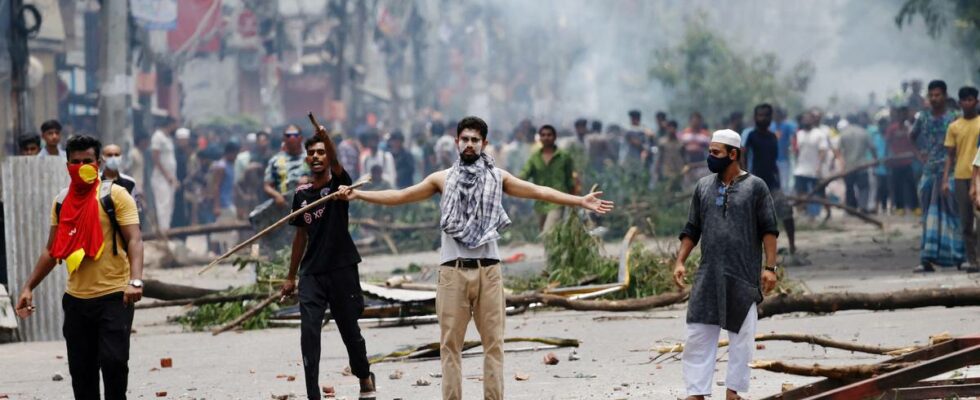It started as a revolt by students who were fed up with the way the government distributed public jobs. Now tens of thousands of Bangladeshis have joined the protests. This week the authorities closed all higher education institutions. At the same time, the riots have escalated in scope. A policeman is beaten by protesters. Photo: Mohammad Ponir Hossain / Reuters On Friday, student protesters stormed a prison in the capital Dhaka and freed the inmates, before setting fire to the building, the police told AFP. The country’s broadcasters were also stormed and set on fire the day before. Around 100 police officers were injured during the incident. The authorities in Bangladesh have introduced a curfew, and have also deployed military forces to assist the police, writes AFP. Over 100 killed On Tuesday, students who are critical of the quota system clashed with counter-demonstrators. The police intervened with rubber bullets and tear gas. On the same day, the offices of the opposition Bangladesh Nationalist Party (BNP) in the capital Dhaka were raided. Students and police stand together in the capital Dhaka on Wednesday. Photo: MUNIR UZ ZAMAN / AFP According to local hospital sources, 75 people have been killed in clashes in recent days. This brings the death toll to over 100. Hundreds have also been injured. Protest against the quota system The students have been protesting since 1 July. It was a reaction to the Bangladeshi Supreme Court resuming an old quota system for appointments to attractive positions in the state leadership. It was originally removed in 2018 after similar student protests. The quota system reserves over half of these positions for descendants of those who fought in the war of independence against Pakistan in 1971. There have also been smaller quotas for women and minorities later on. The students believe that the jobs should go to the best candidates regardless of background. Especially since the number of new jobs in Bangladesh has decreased in recent years, according to a report from the World Bank. The lack of work hits those between 15 and 29 harder than any other group. Nevertheless, more and more people are getting higher education, and more want to work in the public sector. On Thursday, Justice Minister Anisul Huq said the government would review the quota system and work with the student leaders to find a solution. The protesters replied that they have no plans to cooperate with the government. Internal distribution Not all students at the universities are against the quota system. The dividing line is also political, as those in favor of quotas simultaneously support Prime Minister Sheikh Hasina. Hasina said this week that she does not believe the lucrative posts in the government should be given to so-called “razakars”, a term used to refer to those who sided with the Pakistanis in the liberation war. The riots turned violent after clashes between the two groups occurred on Tuesday, and the police were called in. Published 19.07.2024, at 20.17 Updated 19.07.2024, at 20.49
ttn-69
The student protests in Bangladesh are escalating – news Urix – Foreign news and documentaries

